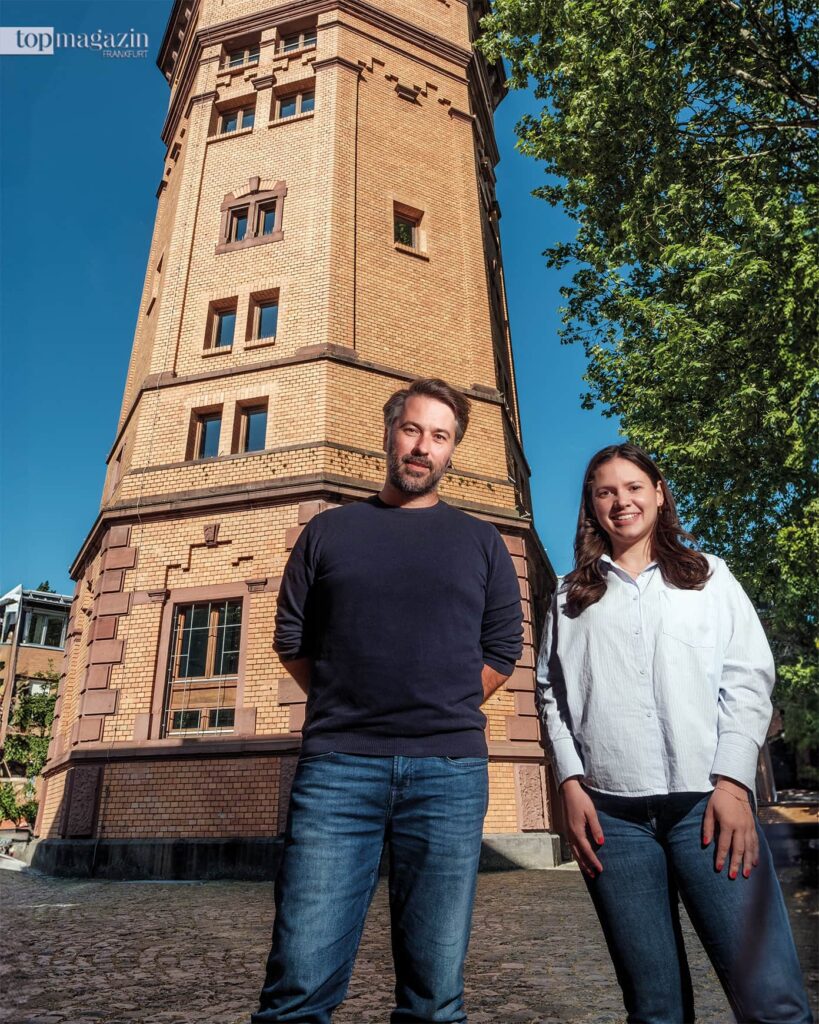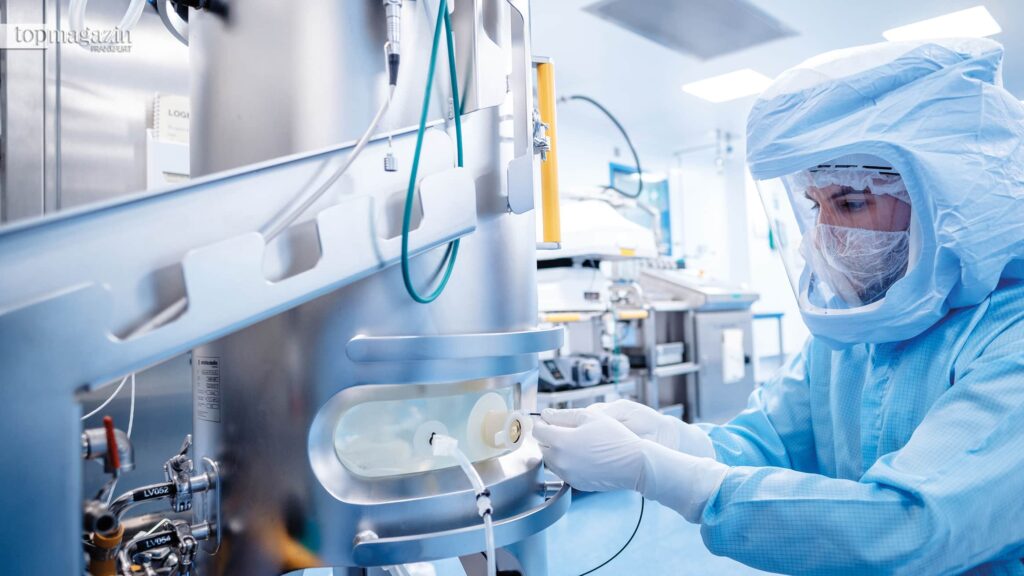The Future Factory: How Futury is revitalizing Frankfurt's startup scene

"The startup scene in the region is better than its reputation," say Melissa Ott and Charlie Müller, the managing directors of "Futury – The Future Factory." Their goal is to establish 1,000 new startups in the Rhine-Main region by 2030. The two welcomed us to the Bertramshof. Until recently, the Hessischer Rundfunk (HRS) was still based in these premises in the Dornbusch district of Frankfurt. The idea is that this is a source of fresh impetus not only for the regional economy, but for all of Germany.
This is a strong move by the major universities, located just a half-hour drive from each other. They're picking up the pace. The Frankfurt School of Finance & Management (45 percent), as well as Goethe University Frankfurt, TU Darmstadt, and Johannes Gutenberg University Mainz (15 percent each) are now jointly involved in Futury. They want to finally fully exploit the region's startup potential. They are backed by 100,000 students and 10,000 researchers.
Futury will be located on 2,000 square meters Starting in September, the Bertramshof will offer around 120 to 130 workspaces for startups. There are meeting and administrative spaces, as well as a beautiful courtyard – perfect for networking and summer parties. "We see ourselves as catalysts," explains Melissa Ott .
Futury aims to promote innovations from universitiesThrough Futury, university founders can connect with industry, which fully supports the initiative. This opens up funding sources and enables pilot projects with partners from the network. The impetus comes at just the right time. More and more university graduates are striving for self-employment with the vision of making the world a better and more efficient place.
Of course, not all applicants find the hoped-for support for their startup. "The ideas," says Ott, "should also be marketable." A pitch must explain what specific problem the new company can solve. Futury offers events that demonstrate how to convince investors.
“Crises are always an opportunity for founders.” – Melissa Ott, Futury
Futury has been around since 2017 – initially under the direction of the Frankfurt Values Foundation. Following its takeover by the four universities, the focus is now on bringing together academic talent from the region with savvy practitioners. "We want to attract as many talented individuals as possible from our institutions and research areas into the business world," explains the industrial engineer with a degree in electrical engineering. The complex global situation and the sluggish growth called for people with a willingness to take risks and commitment. "Crises are always an opportunity for founders."

Melissa Ott dreams of restoring the faded "Made in Germany" seal of quality. She doesn't see her own innovation hotspot as competing with other support structures, such as the TechQuartier in the Pollux skyscraper at the Frankfurt Trade Fair Center. More than 650 startups (212 in Frankfurt alone) and 30 corporate partners are affiliated there.
Capital and mentoring for the Frankfurt startup scene"We need success stories. Germany must become more powerful." – Charlie Müller, Futury
"The more platforms emerge, the better," says Charlie Müller , who has been with Futury from the very beginning as co-founder and managing director. "We need success stories. Germany must become more powerful."
The sister company, Futury Capital, has already provided €80 million since its founding, raising €1 billion from its own ecosystem. Deutsche Bank, Deutsche Börse, the chemical company Merck, and the consulting firm Bain & Company are among Futury GmbH's backers. They primarily provide mentoring to startups and explore pilot opportunities.
Now, a new €40 million fund has been launched. "We want to attract additional investors and leverage €500 million," Müller says, outlining the next steps. This will enable around 200 new startups to be founded per year by 2030. Of course, many young companies don't survive the early stages. "But significant things can also emerge."
Charlie Müller is closely watching the Anglo-Saxon countries. He says it's impressive how easily companies develop from universities there. "We have some catching up to do here. But a lot is happening right now."
Status Quo: Startup Potential in the Rhine-Main AreaIn the past, the development of startups, especially in Frankfurt, has performed less well than expected. More was hoped for, especially with FinTechs. In 2016, Deutsche Börse installed a Fintech Hub with great fanfare, raising enormous hopes. The attempt has since been quietly abandoned.
Unlike Berlin, the German financial capital on the Main River isn't eagerly awaiting startups to boost its financial business. Apparently, that's how things are going. No one wants to throw money at companies. But those who hesitate too long miss out on one development or another. That's about to change. As a financial capital, Frankfurt is fundamentally a good breeding ground for a technology-based financial service.
Overall, Frankfurt's startup performance has room for improvement. With 9.1 startups per 100,000 inhabitants , Darmstadt ranks fifth in the national ranking of the best startup cities in 2024. – significantly ahead of neighboring Frankfurt. Several newcomers are gaining traction there. For example, HCP Sense surprises with deep tech and a sensor system that monitors pumps and reduces energy consumption.
BioNtech as a role model: From university to global corporation
Mainz also has a lot to show for itself. BioNtech began there as a startup. Uğur Sahin and Özlem Türeci participated in a competition organized by the Federal Ministry of Research in 2008 and won. The prize money was tied to the founding of a new research-based company. The two accepted the challenge and are now known worldwide.

BioNTech's founding was closely linked to the University Medical Center of Johannes Gutenberg University. During the coronavirus pandemic, the company experienced a phenomenal boom thanks to its vaccine. BioNTech now aims to improve the health of all humanity through basic research, the development of immunotherapies, and mRNA vaccines.
Successful models from Frankfurt: Emma and RoomheroOf course, startups don't always have to deliver something spectacular and groundbreaking. Good concepts are also sufficient for commercial success. One example is the Frankfurt-based mattress retailer "Emma," even though it has been a bit shaky recently. With a 100-day sleep trial guarantee, purely digital sales channels, and the promise of high quality at a low price, the startup has achieved incredible growth rates since 2015.
Roomhero has also firmly established itself. The Frankfurt-based company has been on the market for eleven years and has been profitable for the last three. The idea of transporting the furnishing of residential and commercial properties into the digital age is paying off. Using appropriate software, rooms are displayed on screen, true to scale, and combined with options. The buyer simply has to select the appropriate furniture and add it to their shopping cart. This "curated living" approach is proving popular – especially among major real estate clients who want to furnish their apartments quickly.
How venture capital calculates the risk of startupsInvestors who invest money in startups are taking a risk that is particularly significant at the beginning. Collateral for conventional debt financing from banks is often lacking. Venture capital has turned this into a business model. It invests in startups, even though nine out of ten fail. They typically choose minority stakes, often between 20 and 35 percent. In return, they provide their business expertise – often combined with control and participation rights.
An early exit is planned. The shares are to be sold again after a few years. Sometimes a promising startup is acquired. Extraordinary returns can be achieved. The losses from startups that fail are more than offset by individual large profits.
Practical example Circolution: A startup for smart reusable solutionsBut how does a startup find the right partners? Circolution from Frankfurt was already supported by Futury six years ago. The platform initially brought the three founders together, or as they say in the industry, "matched them." Maximilian Bannasch , who tells us the Circolution story in a historic building in Frankfurt's Bahnhofsviertel district, and Alessandro Marchiaro remain. They have launched something that partners from the business world consider to be the future of packaging.
"I like doing my own thing. What we've set up at Circolution has a much greater impact." – Maximilian Bannasch, Circolution
They rent reusable stainless steel food containers, track them throughout their entire journey, and handle return logistics. Bannasch studied engineering at the Technical University of Darmstadt and business administration at the University of Applied Sciences (UAS) in Frankfurt. He is now 31 years old. He knows he might have earned more money working for a corporation. "But I like doing my own thing. What we've set up at Circolution has a much greater impact."

The company only has four employees, but that number could soon grow. They've been based on the rather colorful Munich street for four years. The 240-square-meter former apartment is also used by other startups. "I like life here," admits Bannasch. They sometimes sit together at the table for meals and exchange ideas. "It's inspiring." The road is rocky, he says. "But we've already come a long way."
From idea to product: Circolution's path to the supermarketIt began with some private capital, government funding, and Futury's corporate partners, who were able to contribute their extensive experience. The idea of expanding the use of reusable containers in supermarkets fascinates many companies.

At the moment, the metal cups in question are filled with cocoa powder from Nestlé, coffee beans from the Frankfurt-based startup Hoppenworth & Ploch, or espresso beans from the Aschaffenburg roaster Kaffee Braun. "Return to deposit machines in participating supermarkets," the lids read.
Futury wants to bring everyone to the tableSeventy Rewe stores are participating – from Gießen in the north to Weinheim near Heidelberg in the south. Having such a strong company like Rewe involved is a real asset. A €2.50 deposit is added to the products. "This ensures that almost everything actually goes back into the cycle," says Maximilian Bannasch.
Eighteen months ago, in addition to business angels, the packaging company Amcor, a strategic investor also joined the team. Before pitching to the global player, Bannasch consulted with experienced founders and lawyers. This proved successful. Circolution now has an additional €1.1 million at its disposal to advance the project.
"It all sounds pretty simple," he says. But bringing all the partners together can be a real headache. These include a deposit machine manufacturer, a cleaning company, a logistics company, and a label printer.
"Reusable packaging is the future. The big players want to be part of it. A green tech startup like Circolution can make a big difference." – Maximilian Bannasch, Circolution
"Reusable packaging is the future. The big players want to be part of it," the resourceful founder states with satisfaction. It's all about smart packaging that can significantly improve the reusable rate. A greentech startup like Circolution can make a big difference. A lot of packaging waste would be eliminated if a variety of products, not just liquid beverages, were included in the reusable system.

"Ultimately, we want to get as many supermarket chains on board as possible," says Max Bannasch, outlining the goal. The introduced deposit system is a low-threshold and simple solution that can make an important ecological contribution. The startup entrepreneur is quite optimistic. Sometimes, one is overcome by fears that everything might become too big. But that will subside. One just has to keep motivating oneself. "But it's working. The fun of working on a good cause clearly outweighs that."
This article first appeared in our print edition. Want to stay informed faster? Subscribe here.
top-magazin-frankfurt




